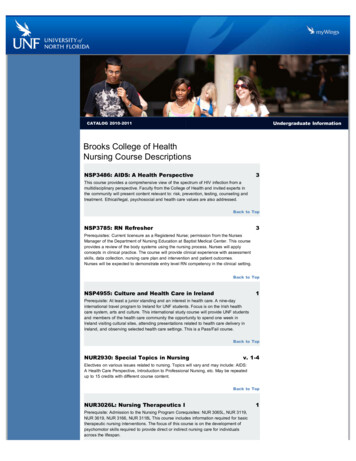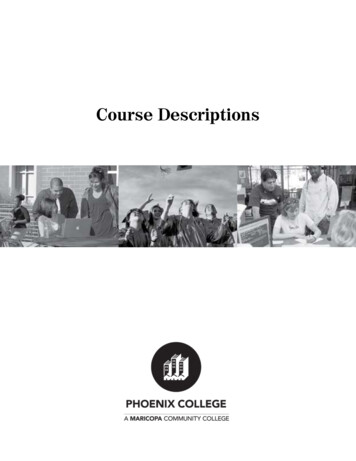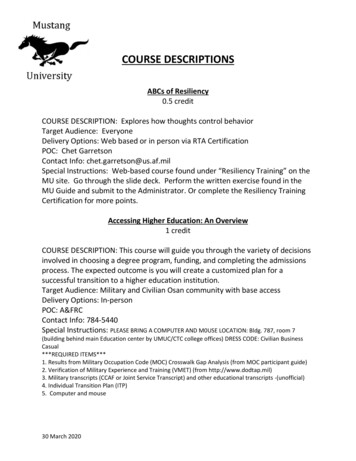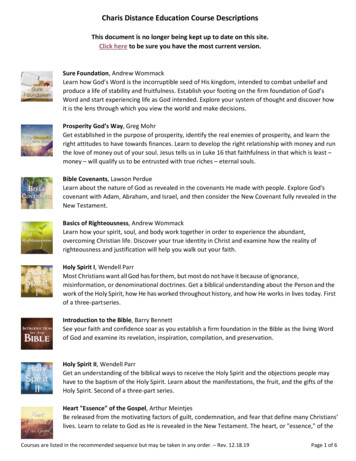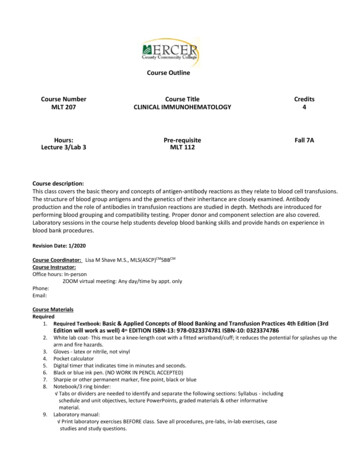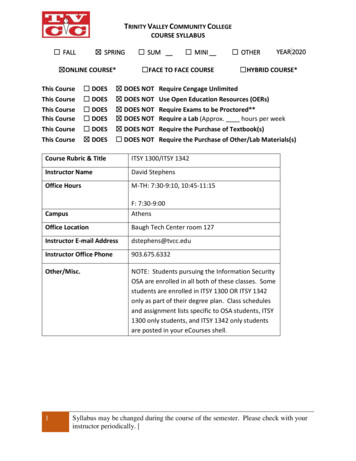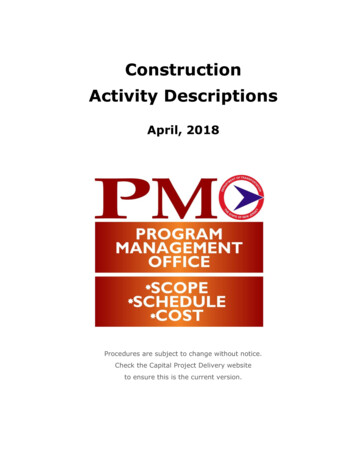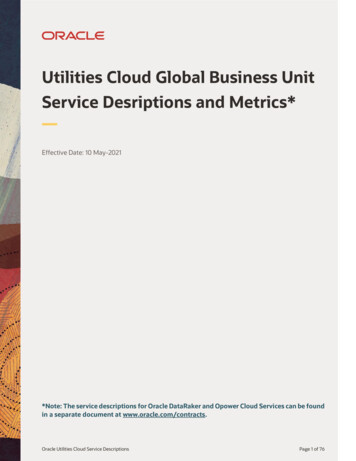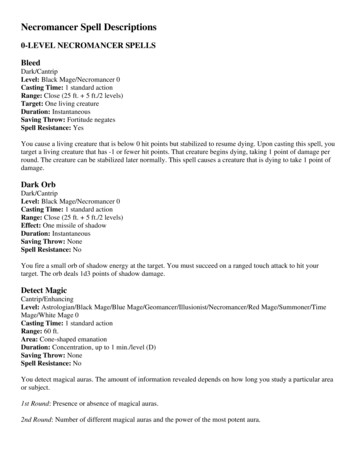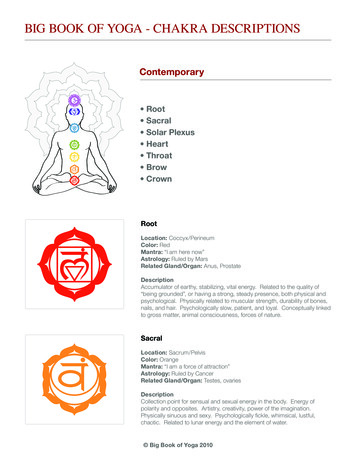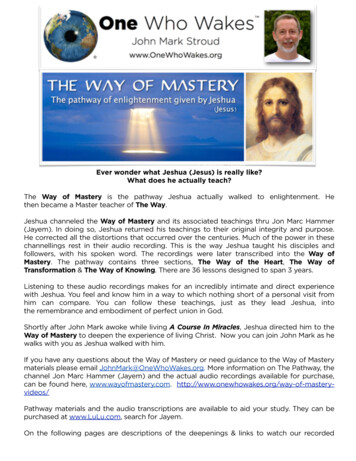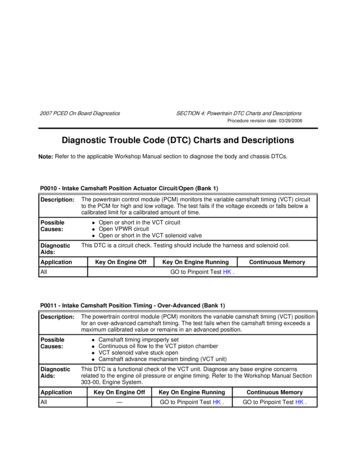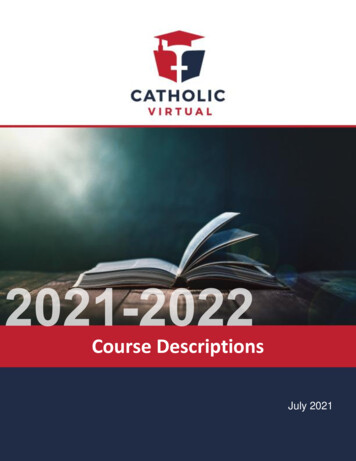
Transcription
Course DescriptionsJuly 2021* Increased cost for course. **Course will NOT have live sessions. §May be found in the public domain. §§Course awards high school credit.‡Customer provided materials required. ‡‡Must purchase full year.Catholic Virtual - Proprietary & Confidential – July 20210
2021-2022 Course DescriptionsHIGH SCHOOL ENGLISH .1ADVANCED PLACEMENT ENGLISH .1HIGH SCHOOL MATH .3ADVANCED PLACEMENT MATH .4HIGH SCHOOL SCIENCE .4ADVANCED PLACEMENT SCIENCE .5HIGH SCHOOL SOCIAL STUDIES .6ADVANCED PLACEMENT SOCIAL STUDIES .6HIGH SCHOOL ELECTIVES .8ADVANCED PLACEMENT HIGH SCHOOL ELECTIVES . 23MIDDLE SCHOOL LANGUAGE ARTS . 24MIDDLE SCHOOL MATHEMATICS . 25MIDDLE SCHOOL SCIENCE . 25MIDDLE SCHOOL SOCIAL STUDIES . 26MIDDLE SCHOOL ELECTIVES . 26ELEMENTARY SCHOOL COURSES . 30ELEMENTARY LANGUAGE ARTS . 30ELEMENTARY MATHEMATICS . 30ELEMENTARY SCIENCE . 31ELEMENTARY SOCIAL STUDIES . 32ELEMENTARY ELECTIVES . 32RELIGIOUS COURSE OFFERINGS . 35CORE THEOLOGY COURSES . 35ELECTIVE THEOLOGY COURSE . 37ELEMENTARY MATERIALS LIST . 38NCAA APPROVED COURSES . 43Catholic Virtual - Proprietary & Confidential – July 2021uly 2020
2021–2022 Course DescriptionsHIGH SCHOOL ENGLISHEnglish I (1.0 credit) and Honors English I (1.0 credit): Survey of LiteratureThis course is designed to integrate all aspects of Language Arts standards into engaging and interactive units organizedaround reading, writing and comprehension skills. Students will analyze the basic elements of plot, setting, mood, characterdevelopment, and more in a variety of literary genres.English II (1.0 credit) and Honors English II (1.0 credit): World LiteratureThis course expands on skills gained in English I. Students will critique arguments, establish patterns of persuasion, anddelve into the language of poetry, history and culture by way of Greek tragedy and Medieval romance.Prerequisite: English I recommendedEnglish III (1.0 credit) and Honors English III (1.0 credit): American LiteratureIn this course, students explore American passages from its beginnings (1600-1800) up to the present day. The courseexamines the process of writing, vocabulary development, and research in English through interactive and traditionallearning exercises.Prerequisites: English I & II recommendedEnglish IV (1.0 credit) and Honors English IV (1.0 credit): British LiteratureStudents enrolled in this course will explore passages from the Anglo-Saxon and Medieval periods (449-1485) up to theVictorian Age (1832-1901). The course examines writing, research, world languages and more through interactive andtraditional learning experiences.Prerequisites: English I, II, & III recommendedADVANCED PLACEMENT ENGLISHAP English Language and Composition (1.0 credit)* ‡This course provides high school students with college-level instruction in analyzing and writing various texts. Studentslearn about the elements of argument and composition as they develop their critical-reading and writing skills. Studentsread and analyze nonfiction works from various periods and write essays with different aims: for example, to explain anidea, argue a point, or persuade the reader of something.This course will effectively prepare students for the AP Englishexam.Prerequisites: English I & IICustomer-Provided Required Physical Materials:Semester A: Choose one of the following: Zen in the Art of Writing by Ray Bradbury§ On Writing Well by William Zinsser§Semester B: Choose two of the following: Narrative of the Life of Frederick Douglass by Frederick Douglass§ A Work in Progress: A Memoir by Connor Franta§ The Reason I Jump: The Inner Voice of a Thirteen-Year-Old Boy with Autism by Naoki Higashida§ The Color of Water: A Black Man's Tribute to His White Mother by James McBride§ The Glass Castle: A Memoir by Jeannette Walls§ I am Malala: The Girl Who Stood Up for Education and Was Shot by the Taliban by Malala Yousafzia§* Increased cost for course. **Course will NOT have live sessions. §May be found in the public domain. §§Course awards high school credit.‡Customer provided materials required. ‡‡Must purchase full year.Catholic Virtual - Proprietary & Confidential – July 20211
I Know Why the Caged Bird Sings by Maya Angelou§ Dust Tracks on a Road by Zora Neale Hurston§ Incidents in the Life of a Slave Girl by Harriet Jacobs§ The Story of My Life by Helen Keller§Semester B: Choose one of the following: Pilgrim at Tinker Creek by Annie Dillard§ Nickel and Dimed: On (Not) Getting By in America by Barbara Ehrenreich§ Mountains Beyond Mountains: The Quest of Dr. Paul Farmer, A Man Who Would Cure the World by Tracy Kidder§ The Devil in the White City: Murder, Magic, and Madness at the Fair that Changed America by Erik Larson§ Up from Slavery: An Autobiography by Booker T. Washington§ Into Thin Air by Jon Krakauer§ The Immortal Life of Henrietta Lacks by Rebecca Skloot§ Warmth of Other Suns by Isabell Wilkerson§ Bury My Heart At Wounded Knee by Dee Brown§ The Boys in the Boat by Daniel James Brown§AP English Literature and Composition (1.0 credit) * ‡The AP English Literature and Composition course focuses on reading, analyzing, and writing about imaginative literature(fiction, poetry, drama) from various periods. Students learn how to understand and evaluate works of fiction, poetry, anddrama from various periods and cultures through the reading of literary works and writing of essays to explain and supporttheir analysis of passages they've read. This course prepares students for the AP English Literature and Composition exam.Prerequisites: English I, II, & III recommendedCustomer-Provided Required Physical Materials:Required Novels: Barron’s How to Prepare for the Advanced Placement Exam English Literature and Composition by GeorgeEhrenhaft Frankenstein by Mary Shelley; (found on GP) The Hollow Men by T. S. Eliot; ISBN-10: 9780156806473, ISBN-13: 978-0156806473 Heart of Darkness by Joseph Conrad; (found on GP) Wuthering Heights by Emily Brontë; (found on GP) The Grapes of Wrath by John Steinbeck; ISBN-10: 0143039431, ISBN-13: 978-0143039433 Hamlet by William Shakespeare; (found on GP) Hamlet video (versions available: Mel Gibson, Kenneth Branagh, Laurence Olivier) The Awakening by Kate Chopin; (found on GP) The Importance of Being Earnest videoChoose one of the following for the research paper: The Joy Luck Club by Amy Tan§ Adventures of Huckleberry Finn by Mark Twain§ The Color Purple by Alice Walker§ Glass Menagerie by Tennessee Williams§Choose one of the following: One Hundred Years of Solitude by Gabriel García Márquez§ Great Expectations by Charles Dickens§ Jane Eyre by Charlotte Brontë§ Adventures of Huckleberry Finn by Mark Twain§ Moby-Dick by Herman Melville§* Increased cost for course. **Course will NOT have live sessions. §May be found in the public domain. §§Course awards high school credit.‡Customer provided materials required. ‡‡Must purchase full year.Catholic Virtual - Proprietary & Confidential – July 20212
Tess of the d'Urbervilles by Thomas Hardy§ Pride and Prejudice by Jane Austen§ The Color Purple by Alice Walker§ Things Fall Apart by Chinua Achebe§ The Stranger by Albert Camus§ The Catcher in the Rye by J. D. Salinger§ Beloved by Toni Morrison§Choose one of the following: Things Fall Apart by Chinua Achebe§ A House Made of Dawn by Scott Momaday§ Cry the Beloved Country by Alan Paton§ Othello by William Shakespeare§HIGH SCHOOL MATHAlgebra I (1.0 credit) and Honors Algebra I (1.0 credit)This course is the foundation for high school mathematics. Students will develop fluency in working with linear equations,tables, graphs, inequalities and more.Prerequisite: Math 8 or Pre-AlgebraAlgebra II (1.0 credit) and Honors Algebra II (1.0 credit)In this course, the basic concepts from Algebra I are enriched. Topics include equations and inequalities; linear equations;linear systems and matrices; quadratic functions and factoring; polynomials and more.Prerequisite: Algebra IPrecalculus (1.0 credit)This course prepares students for topics covered in an elementary Calculus course at the college level. Facility with thesetopics is especially important for students to study calculus, physics or other sciences, and/or engineering in college.Honors Calculus (1.0 credit)‡This course is divided into two semesters and is designed to acquaint students with calculus principles such as derivatives,integrals, limits, approximation, and applications and modeling. During this course, students will gain experience in the useof calculus methods and learn how to apply calculus methods practically. Upon completion of this course students will beable to work with functions represented in a variety of ways: graphical, numerical, analytical, or verbal; understand theconnections among these; understand the meaning of the derivative in terms of a rate of change and local linearapproximation; be able to use derivatives to solve a variety of problems; understand the meaning of the definite integral; beable to use integrals to solve a variety of problems; and understand the relationship between the derivative and the definiteintegral.Prerequisites: Algebra 1, Geometry, Algebra 2, and Pre-Calculus or Trigonometry/Analytical GeometryCustomer-Provided Required Physical Materials: graphing calculator (TI83 or above)* Increased cost for course. **Course will NOT have live sessions. §May be found in the public domain. §§Course awards high school credit.‡Customer provided materials required. ‡‡Must purchase full year.Catholic Virtual - Proprietary & Confidential – July 20213
Geometry (1.0 credit) and Honors Geometry (1.0 credit)Geometry introduces the study of points, segments, triangles, polygons, circles, solid figures and their associatedrelationships as a mathematical system. Students will extend their pre-existing experiences with algebra and geometry totrigonometry, coordinate geometry, and probability.Prerequisites: Algebra I or its equivalentStatistics (1.0 credit) and Honors Statistics (1.0 credit) ‡This course is a practical hands-on approach to the study of statistics and probability. Topics include the use of graphs suchas histograms, stem plots, time plots, and scatter plots to display data; using numbers such as median, mean, and standarddeviation to describe data; and evaluating data distribution. Students examine relationships using correlations and leastsquare regressions. They calculate the probability of simple and compound events. They learn to estimate with confidence,explore tests of significance, and evaluate the validity of statistics contained within published reports.Customer-Provided Required Physical Materials: graphing calculator (TI83 or above)ADVANCED PLACEMENT MATHAP Calculus AB (1.0 credit) *‡In AP Calculus AB, an introductory college-level calculus course, students explore the concepts, methods, andapplications of differential and integral calculus. They work to understand differential and integral calculus through engagingwith real-world problems represented graphically, numerically, analytically, and verbally and using definitions and theoremsto build arguments and justify conclusions as they explore concepts like change, limits, and the analysis of function. Thiscourse fulfills the requirements for the Advanced Placement Calculus AB exam.Prerequisites: Algebra I, Geometry, Algebra II, and Pre-Calculus or Trigonometry/Analytical GeometryCustomer-Provided Required Physical Materials: graphing calculator (TI83 or above)AP Calculus BC (1.0 credit) *‡AP Calculus BC is an introductory college-level calculus course in which students explore the concepts, methods, andapplications of differential and integral calculus, including topics such as parametric, polar, and vector functions, and series.This course fulfills the requirements for the Advanced Placement Calculus BC exam.Prerequisites: Algebra I, Geometry, Algebra II, and Pre-Calculus or Trigonometry/Analytical GeometryCustomer-Provided Required Physical Materials: graphing calculator (TI83 or above)AP Statistics (1.0 credit) * ‡AP Statistics is an introductory college-level statistics course that introduces students to the major concepts and toolsused for collecting, analyzing, and drawing conclusions from data. Students explore statistics through discussion andactivities, and design surveys and experiments. This course prepares students for teh AP Statistics exam.Prerequisite: Algebra IICustomer-Provided Required Physical Materials: graphing calculator (TI83 or above)HIGH SCHOOL SCIENCEBiology (1.0 credit) and Honors Biology (1.0 credit)This course investigates the relationship between structure and function from molecules to organisms and systems theinterdependence and interactions of biotic and abiotic components of the environment, and mechanisms that maintaincontinuity and lead to changes in population over time.* Increased cost for course. **Course will NOT have live sessions. §May be found in the public domain. §§Course awards high school credit.‡Customer provided materials required. ‡‡Must purchase full year.Catholic Virtual - Proprietary & Confidential – July 20214
Chemistry (1.0 credit) and Honors Chemistry (1.0 credit)Chemistry is the investigation of atomic and molecular-level properties and interactions. The course begins with propertiesof matter, atomic structure, and basic atomic bonding.Environmental Science (1.0 credit)This course gives students a coherent and realistic picture of the applications of a variety of scientific concepts as theymanifest in our environment. The aim of this course is to increase students’ knowledge of environmental challenges oftoday, while continuing to cultivate scientific critical thinking skills.Physics (1.0 credit) and Honors Physics (1.0 credit)This course examines the relationship between matter and energy and how the two interact. Students explore physicsconcepts such as thermodynamics, magnetism, waves and sound, and more.ADVANCED PLACEMENT SCIENCEAP Biology (1.0 credit)* ‡AP Biology is an introductory college-level biology course in which students study the core scientific principles, theories,and processes that govern living organisms and biological systems. Students perform hands-on laboratory work toinvestigate natural phenomena. This course prepares students for the AP Biology exam.Prerequisites: Biology, Chemistry, and Algebra I recommendedCustomer-Provided Required Physical Materials: household items for lab experimentsAP Chemistry (1.0 credit)* ‡In AP Chemistry course, the equivalent of an introductory college chemistry course, students learn about the fundamentalconcepts of chemistry including structure and states of matter, intermolecular forces, and reactions. Students do hands-onlab investigations and use chemical calculations to solve problems.This course prepares students for the AP Chemistryexam.Prerequisites: Chemistry, Algebra I, and Algebra IICustomer-Provided Required Physical Materials: AP Chemistry Chang – Raymond Chang, Kenneth Goldsby – 12th Edition, 2016; ISBN-13: 978-0076727704; ISBN10: 007672770X Cracking the AP Chemistry Exam, 2020 Edition; ISBN-13: 978-0525568186; ISBN-10: 0525568182 Advanced Microchem Kit stry/advanced-microchem-kit/)AP Environmental Science (1.0 credit)* ‡AP Environmental Science provides students with the opportunity to explore and investigate the interrelationships of thenatural world and analyze environmental problems, both natural and human-made. Students take part in laboratoryinvestigations and field work.scientific principles, concepts, and methodologies required to understand the interrelationshipsof the natural world. This course prepares students for the AP Environmental Science exam.Prerequisites: Algebra I and two years of high school science with labsCustomer-Provided Required Physical Materials: household items for lab experiments* Increased cost for course. **Course will NOT have live sessions. §May be found in the public domain. §§Course awards high school credit.‡Customer provided materials required. ‡‡Must purchase full year.Catholic Virtual - Proprietary & Confidential – July 20215
AP Physics 1 (1.0 credit)* ‡In AP Physics 1, an algebra-based physics course, students learn about the foundational principles of physics as youexplore Newtonian mechanics; work, energy, and power; mechanical waves and sound; and introductory, simple circuits.They do hands-on laboratory work to investigate phenomena. This course prepares students to take the College Board’sAdvanced Placement Physics exam.Customer-Provided Required Physical Materials: StudyForge digital textbook graphing calculator Cracking the AP Physics 1 Exam, 2020 Edition; ISBN-13: 978-0525568308; ISBN-10: 0525568301 Lab MaterialsHIGH SCHOOL SOCIAL STUDIESEconomics (0.5 credit) and Honors Economics (0.5 credit)Economics is the study of how humans make decisions in the face of scarcity. Students will learn the principles of economicsand how the subject applies to everyday life.U.S. Government (0.5 credit) and Honors U.S. Government (0.5 credit)U.S. Government will introduce to students the main concepts that have become inherent within our modern government.Students will learn the function of political systems, the purpose of a party system, how policy is decided, elections, voting,and the basic ideas that are associated with being a participant within a political system. Students will look at thedevelopment of our government from its inception to the modern incarnation that it has become. A primary goal of thiscourse will be to teach students the concepts associated with the idea of civil efficacy.U.S. History (1.0 credit) and Honors U.S. History (1.0 credit)Students in this course will apply their broader knowledge of historical study and American history to a more specific erawithin U.S. history. The course explores the dynamic growth and change of the nation following important events such asthe Civil War.World History (1.0 credit) and Honors World History (1.0 credit)This course explores the variety of cultures, beliefs and lifestyles that have existed throughout human existence. Studentswill gain an understanding of human progression and appreciation for the achievements necessary to allow us to exist inour modern world.ADVANCED PLACEMENT SOCIAL STUDIESAP European History (1.0 credit) * ‡In AP European History students study the cultural, economic, political, and social developments that have shaped Europefrom c. 1450 to the present. Students analyze texts, visual sources, and other historical evidence and write essaysexpressing historical arguments.This course prepares students for the AP European History exam.Customer-ProvidedRequired Physical Materials: Western Heritage, since 1300 (12th edition, eText) ISBN-10: 0135260434 ISBN-13: 9780135260432 Cracking the AP European History Exam, 2020 Edition ISBN-13: 978-0525568261 ISBN-10: 0525568263* Increased cost for course. **Course will NOT have live sessions. §May be found in the public domain. §§Course awards high school credit.‡Customer provided materials required. ‡‡Must purchase full year.Catholic Virtual - Proprietary & Confidential – July 20216
AP Human Geography (1.0 credit) *In AP Human Geography course students explore how humans have understood, used, and changed the surface of Earth.Students use the tools and thinking processes of geographers to examine patterns of human population, migration, andland use. This course prepares students for the AP Human Geography exam.AP Macroeconomics (0.5 credit) *AP Macroeconomics is a semester-length introductory college-level course in which students explore the principles ofeconomics that apply to an economic system as a whole. Students use graphs, charts, and data to analyze, describe, andexplain economic concepts.This course prepares studens for the AP Macroeconomics exam.Prerequisite: Algebra I recommendedAP Microeconomics (0.5 credit) *AP Microeconomics, a semester-long introductory college-level microeconomics course, allows students to study theprinciples of economics that apply to the behavior of individuals within an economic system. They use graphs, charts, anddata to analyze, describe, and explain economic concepts.This course prepares students for the AP Microeconomics exam.Prerequisite: Algebra I recommendedAP Modern World History (1.0 credit) * ‡In this course, students study the cultural, economic, political, and social developments that have shaped the world from c.1200 CE to the present. They analyze texts, visual sources, and other historical evidence and write essays expressinghistorical arguments. This course prepares students to take the College Board’s Advanced Placement World History exam.Customer-Provided Required Physical Materials: Bentley, Traditions & Encounters: A Global Perspective on the Past UPDATED AP Edition 2017, 6e, StudentEdition; ISBN-13: 978-0076681280; ISBN-10: 0076681289 AP World History Modern Prep Plus 2020 & 2021; ISBN-13: 978-1506248127; ISBN-10: 1506248128AP Psychology (1.0 credit) *The AP Psychology course provides students with the opportunity to explore the ideas, theories, and methods of thescientific study of behavior and mental processes. Students examine the concepts of psychology through reading anddiscussion and analyze data from psychological research studies.This course prepares students for the AP Psychologyexam.AP U.S. Government and Politics (0.5 credit) *Within AP U.S. Government and Politics, a semester-long course, students study the key concepts and institutions of thepolitical system and culture of the United States. They read, analyze, and discuss the U.S. Constitution and other documentsas well as complete a research or applied civics project. This course prepares students for the AP U.S. Government andPolitics exam.Prerequisite: United States History recommendedAP U.S. History (1.0 credit) *AP U.S. History, an introductory college-level course, gives students an opportunity to study the cultural, economic,political, and social developments that have shaped the United States from c. 1491 to the present. Students analyze texts,visual sources, and other historical evidence and write essays expressing historical arguments. This course preparesstudents for the AP United States History exam.Prerequisite: World History recommended* Increased cost for course. **Course will NOT have live sessions. §May be found in the public domain. §§Course awards high school credit.‡Customer provided materials required. ‡‡Must purchase full year.Catholic Virtual - Proprietary & Confidential – July 20217
HIGH SCHOOL ELECTIVESAccounting (0.5 credit)In this semester course, students explore accounting and accounting careers. They learn basic accounting skills andprocedures both with and without a computer for general journals, general ledgers, cash payments journals, cash receiptsjournals, sales journals, accounts payable ledgers, and accounts receivable ledgers. Students also learn how to reconcilea bank statement and to prepare payroll records.Advanced Drawing (0.5 credit) ** ‡In Advanced Drawing, students review basic drawing skills and the elements and principles of design. They explore howeach of these are used in art, expand their knowledge of art history, and explore, in depth, several different types of mediaand artistic styles in order to begin to define their personal aesthetic. All projects in this course will be original compositionsby the student. At the end of the last four modules, students will participate in either a self- or peer-critique to help themlearn to analyze their work and grow as an artist from the input of others. At the end of the course, students will compile andorganize their artwork into a digital portfolio and write an artist statement that can be used as a record of personalaccomplishment or as an application to a secondary art program or job.Customer-Provided Required Physical Materials: drawing pencil set 2H, HB, 2B, 4B, 6B, 8B (preferably woodless) 9 12 multimedia sketch book – 60 sheets 18 24 pastel paper, assorted colors (gray, tan, black, and burnt umber) – 10 sheets oil pastels – at least 24-piece set high quality colored pencils – 36-piece set (recommend Prismacolor brand or similar quality) chalk pastels – 24-piece set high-quality art markers (tombow, Prismacolor, or similar brand) water based or alcohol based – primary colors andflesh tones 1 black fine point Sharpie 1 black ultra-fine point Sharpie 1 kneaded eraser 1 white eraser 1 hand-held pencil sharpenerOptional Materials: Finishing spray for pastels Assorted blending stumps and tortillions 18 24 portfolio to keep artwork toolbox to keep suppliesAmerican Sign Language I (1.0 credit)Jump start an American Sign Language journey by learning the basics of this visual language and exploring the Deaf culture.Students will broaden their concept of communication through connections and comparisons to their own culture andcommunity.* Increased cost for course. **Course will NOT have live sessions. §May be found in the public domain. §§Course awards high school credit.‡Customer provided materials required. ‡‡Must purchase full year.Catholic Virtual - Proprietary & Confidential – July 20218
American Sign Language II (1.0 credit)This course reinforces the fundamental skills acquired in the American Sign Language I course. Students continue theirjourney by increasing their interpretive and communication skills of this visual language while continuing to explore the Deafculture. Students will broaden their concepts of communication through connections and comparisons to their own cultureand community.Prerequisite: American Sign Language IAnatomy & Physiology (1.0 credit)This course covers the basics of human anatomy and physiology including anatomical terminology, basic biochemistry,cells and tissues, and the integumentary, skeletal, muscular, nervous, endocrine, cardiovascular, immune, respiratory,digestive, urinary and reproductive systems.Art Appreciation (0.5 credit)Art Appreciation investigates how quality is determined and created by artists, in order to evaluate and appreciate art on adeeper level. Students are introduced to the elements and principles of art and the importance of artists’ context andperspective. The course covers different periods in art history, different techniques in art, and how to research and evaluateart, emphasizing why each contributes to valuing a piece of art and provides the necessary knowledge to do so.Art History (0.5 Credit)This Art History course integrates the four components of art study: art production, historical and cultural context, criticalprocess and aesthetic process. Students identify and describe art from prehistoric times to modern time. Throughout thiscourse, students discuss various artworks, research artists, and create documents and presentations demonstratingconcepts learned.Arts Careers (0.5 credit) ‡For every Broadway dancer, every television star, and every pop singer, there are countless people behind the sceneshelping to make it happen. Arts Careers introduces students to the skills that are part of many fascinating careers in thearts. Studying the arts creates independent and innovative thinkers and many doors are open to an artist with the propertraining.Customer-Provided Required Physical Materials: digital camera (camera phone, DSLR and other devices with a camera is acceptable) video camera (camera phone, DSLR and other devices with a camera is acceptable) video software (iMovie and other video editing software is acceptable)Arts Explorations (0.5 credit) ‡The Arts Explorations course encourages students to experience each of the modern arts disciplines—visual arts, theatre,music, media arts, and dance. Students identify areas of special interest where they would like continued study and theways that the arts can be a part of their career paths as they move quickly through the lessons in the course.Customer-Provided Required Physical Materials: Funny Photomaker (free download)Augmented and Virtual Reality Applications (0.5 credit)Recent advances in technology have allowed augmented and virtual reality (AR/VR) systems to become extremelysophisticated and realistic. This course introduces students to the technologies that underpin AR/VR systems. The coursewalks through five applications of AR/VR and how they will change and impact numerous aspects of our lives and theeconomy. Students also learn about and discuss the risks and side effects of these systems on health, privacy, and ethicalimplications.* Increased cost for course. **Course will NOT have live sessions. §May be found in the public domain. §§Course awards high school credit.‡Customer provided materials required. ‡‡Must purchase full year.Catholic Virtual - Proprietary & Confidential – July 20219
Basic Drawing (0.5 credit) ** ‡In Basic Drawing, students experiment with several different art materials and tools to see what each tool can do best.Students explore ordinary things around them to
read and analyze nonfiction works from various periods and write essays with different aims: for example, to explain an idea, argue a point, or persuade the reader of something.This course will effectively prepare students for the AP Englis
